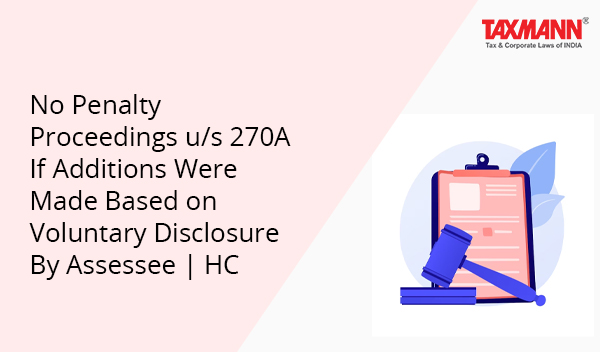No Penalty Proceedings u/s 270A If Additions Were Made Based on Voluntary Disclosure By Assessee | HC
- Blog|News|Income Tax|
- 2 Min Read
- By Taxmann
- |
- Last Updated on 10 January, 2024

Case Details: Chambal Fertilizers and Chemicals Ltd. vs. Office of the Principal Commissioner of Income-tax - [2024] 158 taxmann.com 184 (Rajasthan)
Judiciary and Counsel Details
-
- Arun Bhansali & Shubha Mehta, JJ.
- Sanjay Jhanwar, Sr. Adv. Ms Vrinda Lakhotia, Rajat Sharma & Aryan Singh Chouhan for the Petitioner.
- Shantanu Sharma & Ms Bhawana Laddha for the Respondent.
Facts of the Case
The assessee filed its original return of income under Section 139(1) for the Assessment Year 2018-19. During the scrutiny proceedings, the assessee realized that the ‘provision for doubtful GST input tax credit’ had been inadvertently merged with another expense account and mistakenly claimed as deduction.
Accordingly, the said amount was suo moto surrendered by the assessee by revising its return of income and adding back the amount’ provision for doubtful GST input tax credit’, to the total income. The Assessing Officer (AO) passed the assessment order, and a penalty under section 270A was imposed for misreporting of income.
The assessee filed an application under section 270AA against such penalty order, but it was rejected. Subsequently, the assessee challenged the rejection through a petition under section 264, which was also denied.
Assessee filed a writ petition before the Rajasthan High Court.
High Court Held
The High Court ruled that the revising authority, without providing any substantial reasons and in a perfunctory manner, merely suggested that the assessee’s case fell under both Clause (a) and (c) of Section 270A(9).
The merging GST Input Credit with expenses was not pointed out/detected by AO, and the same was only pointed out voluntarily by the assessee. Therefore, sub-Clauses (a) and (c) of Section 270A (9) are not attracted.
Moreover, it was evident that the Deputy Commissioner breached the stipulations of the proviso to Section 270AA(4) by neglecting to afford any opportunity for a hearing. The order he issued was extremely brief, and it failed to specify the section under which the assessee’s case fell within Section 270A(9).
The fact that the indications were made that the matter falls within (a) and (c) necessarily means that even he was not sure whether it was a case of misrepresentation, suppression of facts, or claim of expense not substantiated by any evidence.
Therefore, the order passed by the revisional authority rejecting the revision petition cannot be sustained.
Disclaimer: The content/information published on the website is only for general information of the user and shall not be construed as legal advice. While the Taxmann has exercised reasonable efforts to ensure the veracity of information/content published, Taxmann shall be under no liability in any manner whatsoever for incorrect information, if any.

Taxmann Publications has a dedicated in-house Research & Editorial Team. This team consists of a team of Chartered Accountants, Company Secretaries, and Lawyers. This team works under the guidance and supervision of editor-in-chief Mr Rakesh Bhargava.
The Research and Editorial Team is responsible for developing reliable and accurate content for the readers. The team follows the six-sigma approach to achieve the benchmark of zero error in its publications and research platforms. The team ensures that the following publication guidelines are thoroughly followed while developing the content:
- The statutory material is obtained only from the authorized and reliable sources
- All the latest developments in the judicial and legislative fields are covered
- Prepare the analytical write-ups on current, controversial, and important issues to help the readers to understand the concept and its implications
- Every content published by Taxmann is complete, accurate and lucid
- All evidence-based statements are supported with proper reference to Section, Circular No., Notification No. or citations
- The golden rules of grammar, style and consistency are thoroughly followed
- Font and size that’s easy to read and remain consistent across all imprint and digital publications are applied



 CA | CS | CMA
CA | CS | CMA
